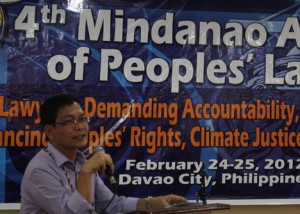
NO GENUINE CHANGE. Davao City lawyer Joel Mahinay says there was no fundamental and genuine change in the country’s system of governance after the Edsa People Power. (davaotoday.com photo by Medel V. Hernani)
“We’ve been lagging behind in democracy. It’s the same system.” – Davao City Vice-mayor Rodrigo Duterte
By MARILOU AGUIRRE-TUBURAN
Davao Today
DAVAO CITY, Philippines — If Davaoeños are to assess it, not much has changed 26 years after the late dictator Ferdinand Marcos was ousted by the people’s popular uprising called Edsa People Power.
“We’ve been lagging behind in democracy. It’s the same system,” Vice-mayor Rodrigo Duterte recently said in his local television program.
In February 25, 1986, millions of Filipinos across the nation demand the removal of Marcos who has ruled the country for decades and declared martial law in 1972. Thousands have become victims of human rights violations including the desaparecidos or those who were victims of forced disappearance.
“Why was Marcos ousted?” lawyer Joel Mahinay, external vice president of the Union of People’s Lawyers in Mindanao, emphasized that Edsa People Power commemoration should be put in this context. “There should have been genuine and fundamental change in our system of governance (right after his removal),” he said.
But this human rights lawyer laments that while Marcos was removed from office, the old system was not. “We’ve been changing presidents but the Filipino people’s problems persist,” Mahinay said.
“The Philippines’ dismal situation continues. The problems on poverty, landlessness and unemployment still exist and are widespread,” Sheena Duazo, spokesperson for the umbrella organization Bagong Alyansang Makabayan (Bayan)-Southern Mindanao, said.
Latest survey from the Social Weather Stations (SWS) said unemployment rose to 24 percent in December 2011 from 20.2 percent in September of the same year. By the end of 2011, an estimated 9.7 million Filipinos are jobless. Of the same period, SWS survey noted 45 percent of Filipino families or an estimated 9.1 million families consider themselves poor while hunger affects 22.5 percent of Filipino families or an estimated 4.5 million families.
Hunger and unemployment are two major problems that Filipinos have been facing since democracy was believed to be restored. Since Cory Aquino’s time until President Benigno ‘PNoy’ Aquino III’s rule, the same remains true.
“Walang silbi ang demokrasya kung wala namang pagbabago sa nakakarami (There is no democracy if majority of the people’s lives have not changed.),” PNoy said in his speech during the Edsa 26th rites in Manila.
“There is no democracy under PNoy,” Bayan’s Duazo said. She scored the governments from Cory Aquino until PNoy, saying “injustice, poverty and hunger continue to affect the people.”
Duazo also criticized the PNoy government for its “subservience to the dictates of the imperialist United States” through laws that favor foreign capitalists. She cited the entry of big foreign mining companies in the country saying, “The government is selling our sovereignty to these big foreign corporations.”
Duterte said Pres. Aquino “has about so many years” to achieve the main objective of Edsa People Power under his administration.
“Let us see. Maybe in the course of time, he could have some achievements in his governance,” Duterte said, adding the latter is so focused in his anti-corruption program. (Marilou Aguirre-Tuburan/davaotoday.com










